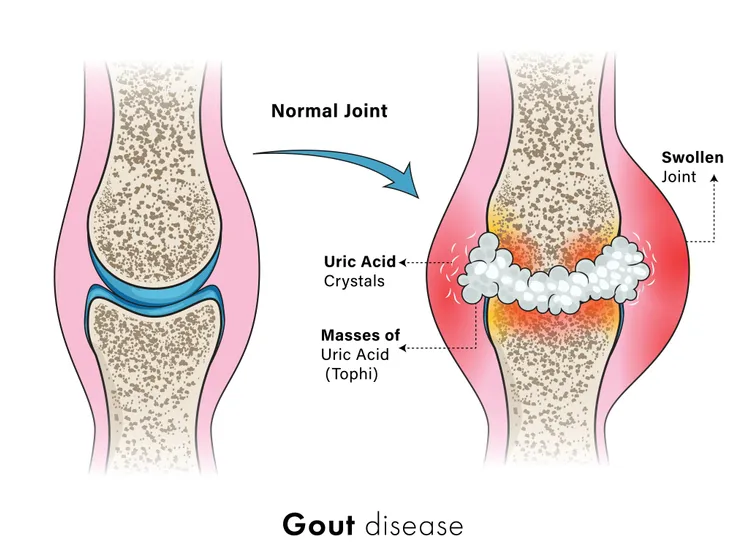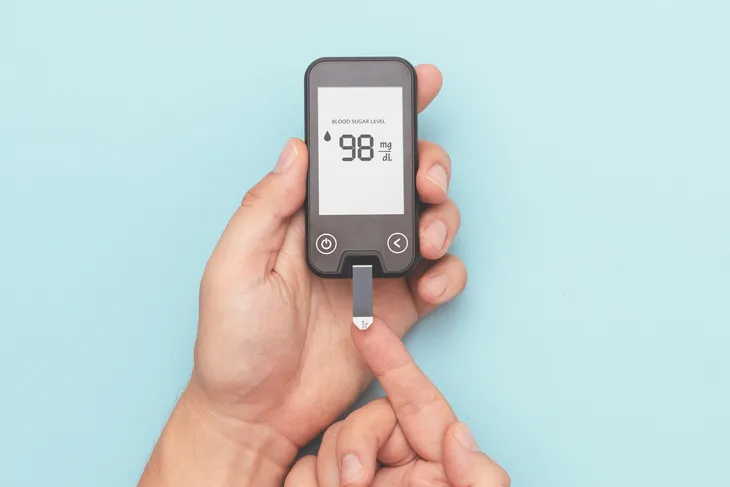Gout and diabetes are two separate medical conditions, but if you have one, you’re more likely to develop the other. Diabetes, like gout, has been related to a variety of major health problems, including heart disease and kidney damage.
Gout is a painful form of arthritis characterized by recurring bouts of a red, sensitive, hot, and swollen joint. Diabetes, on the other hand, is a condition that develops when your blood glucose (often known as blood sugar) is abnormally high. But can diabetes cause gout? Let’s find out.
What Is Diabetes & What Causes It?
Diabetes is classified into two types: type 1 and type 2. Both types of diabetes are long-term disorders that impair your body’s capacity to manage blood sugar (glucose). Glucose is the fuel that powers your body’s cells, but the hormone that regulates glucose in the body is required for it to enter the cells. Without it, glucose remains in the bloodstream which may lead to dangerous complications such as hyperglycemia.
The primary distinction between the two types of diabetes is that type 1 is a hereditary condition that typically develops in childhood, whereas type 2 is mostly a diet-related disease that develops over time. So, what causes it? Although the specific cause of gout and type 2 diabetes is unknown, there are a few suggestions. Let’s take a look next.
What Causes Gout?
Gout is caused by an excess of uric acid in the blood, which is referred to as hyperuricemia. This acid is produced when your body breaks down purines, which are chemicals found in body tissue and some foods. Normally, acid dissolves in your blood which then flows through your kidneys and then is expelled when you urinate.
The levels of uric acid in your blood get too high if your body produces too much or if your kidneys can’t filter it out quickly enough. The acid crystallizes over time, becoming lodged in your joints or soft tissue. This is what causes the agonizing symptoms.
Gout is a condition that produces inflammation in the body. Inflammation, according to some scientists, may also play a role in diabetes. People with type 2 diabetes, on the other hand, frequently have excessive levels of uric acid in their blood, which could be attributed to excess fat.
The Link Between Gout and Diabetes
There is a link between gout and diabetes. In addition to inflammation, high uric acid levels (hyperuricemia) can also cause resistance to the hormone that regulates glucose in the body. Resistance to this hormone occurs when your body does not respond adequately to it, resulting in an excess of sugar in your system.
In addition to potentially developing type 2 diabetes, resistance to this hormone may also play a role in the development of gout as well as obesity and high blood pressure, both of which are risk factors for gout.
Risk Factors for Gout and Diabetes
Despite significant differences between these two medical conditions, gout and type 2 diabetes do share some of the same risk factors. Let’s take a look at some of the common risk factors to watch out for.
Obesity or Being Overweight
If you carry extra fat on your body, you’re more likely to have both gout and type 2 diabetes. WebMD points out that almost 90-percent of individuals with type 2 diabetes are overweight or obese. And individuals who are overweight are four times more likely to develop gout compared to an individual with a healthy weight.
So, why does weight increase your risk for both gout and diabetes? Carrying extra weight decreases your kidney’s ability to remove uric acid from the body.
Excessive Alcohol Consumption
According to research, drinking alcohol (particularly beer and strong liquor) boosts uric acid levels in the blood. That said, moderate alcohol use, which is defined as one drink per day for women and men over 65, and two drinks per day for men 65 and younger, may actually reduce your risk of developing diabetes.
In contrast, too much can interfere with how your pancreas releases the hormone that regulates glucose in the body, leading to type 2 diabetes. Furthermore, more than two drinks each day can also increase your chances of developing gout. Needless to say, be sure to watch your alcohol intake.
Other Risk Factors
Genetics can also increase your risk. If you have family members who suffer from gout and/or type 2 diabetes, you are genetically susceptible to developing these conditions.
Further, type 2 diabetes is associated with a higher prevalence of high blood pressure, obesity, and impaired kidney function. These comorbid diseases increase the risk of gout.
Finally, diabetes and gout are both linked to a higher risk of heart attacks, kidney failure, and death. As a result, the link between diabetes and gout has gotten a lot of attention.
How to Manage and Prevent Gout and Diabetes
If you have gout or diabetes or wish to avoid it, it’s critical to keep your uric acid and blood sugar levels under control. Some of the most effective ways to do this are through your behaviors and lifestyle. Let’s take a look at some changes you can make.
Be Mindful of Your Diet
To reduce your risk of diabetes, eat meals that are low in calories and fat yet high in fiber. The best foods are fruits, vegetables, and whole grains.
If you wish to prevent gout, avoid red meat, shellfish, sugary foods and drinks, and alcohol (especially beer). Further, low-fat dairy foods may help you avoid gout, so include them in your diet.
Improve Your Physical Fitness
Regular exercise can help you control your blood sugar and help you lose weight, both of which can assist your body in ridding itself of excess uric acid. However, it’s vital that you don’t go on a crash diet or engage in too much strenuous activity too quickly.
Rapid weight loss might cause an increase in uric acid. It’s best if you consult your doctor about which activities are beneficial to both diseases.
Stay Hydrated
Drinking enough water daily is important for your overall health, but it is also known to help flush out uric acid. Hydration is also important for keeping your kidneys in good shape.
A good target is to drink 64-ounces of water per day or around eight glasses. When you’re exercising don’t forget to drink more!
Manage Other Potential Health Issues
Finally, another way you can help prevent gout and diabetes is by managing other health issues. For example, if you have high cholesterol, high blood pressure, or a kidney illness make sure you get these conditions under control. Follow your doctor’s advice and take all of your medications as prescribed.
Treatment Options for Gout and Diabetes
The severity of gout varies from person to person. Over-the-counter anti-inflammatory medications such as ibuprofen and naproxen sodium can sometimes relieve pain and inflammation. However, it’s best to follow the advice of your doctor.
To lessen your risk of gout, those with diabetes should keep their uric acid levels below 6-milligrams per deciliter (mg/dL). If you don’t know your number, ask your doctor to test your blood. If your levels are too high, your doctor may prescribe medicine to help you produce less uric acid or to help your kidneys eliminate it faster.
When you are overweight, your body produces more of the hormone that regulates glucose in the body which makes it difficult for your kidneys to eliminate uric acid, ultimately increasing your risk of gout. Physical activity, a healthy weight, and a well-balanced diet can all help cure your resistance to this hormone. Keep in mind, if left untreated it can progress to prediabetes and type 2 diabetes which is why it’s vital you get it under control.
The Takeaway
As you can see, even though we don’t have conclusive evidence that type 2 diabetes causes gout, there is plenty of data to link the two. The best solution to keep these conditions under control is to pay attention to your habits and lifestyle by engaging in regular exercise, eating a healthy diet, and maintaining a healthy weight. If you’re concerned about your risks, book an appointment with your doctor.

















